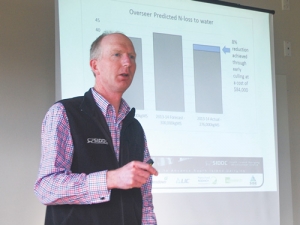Low-footprint feed drives high-profit, low-emissions dairy
The key to a dairy system that generates high profit with a low emissions intensity is using low footprint feed, says Fonterra program manager on-farm excellence, Louise Cook.
 Ron Pellow, executive director of Lincoln University’s South Island Dairying Development Centre (SIDDC), presenting LUDF’s production figures to farmers at a focus day at Ashburton.
Ron Pellow, executive director of Lincoln University’s South Island Dairying Development Centre (SIDDC), presenting LUDF’s production figures to farmers at a focus day at Ashburton.
The Lincoln University Dairy Farm (LUDF) is showing the way to make a profit even with the depressed world prices for milk solids.
About 320 dairy farmers at a focus days heard how LUDF has produced milk solids for $3.50/kg farm working expenses (FWE) or less -- down from $4.28 and $3.87 in the two previous seasons.
The farm also boasts yields better than 1800kgMS/ha and 520kgMS/cow on imported dry matter feed of only 126kg/cow.
The focus day, examining LUDF's end-of-season financial performance, is one of four the farm holds each year in nearby regions Duntroon, Temuka, Ashburton and Culverden. All other focus days are held at the LUDF farm.
While the figures are not necessarily better than those of other farms, Ron Pellow, executive director of Lincoln University's South Island Dairying Development Centre (SIDDC), says there were "gains and opportunities" farmers could adopt.
LUDF was grateful for the co-operation of seven Canterbury farms whose production statistics were a benchmark for LUDF comparison and "to see if we really are as profitable as we think".
middle of that group of farms but the two standout farms have nearly double or double our profitability. So they've done a combination of things that have significantly improved their profitability relative to the rest of our group including ourselves," says Pellow.
"We are getting better all the time at growing more grass with less input, and feeding that grass more efficiently to our herd, to maximise milk produced and sold, and minimise the amount of feed required for other requirements that don't actually generate milk."
Pellow says a major focus for LUDF is nitrate control. "We are probably ahead of the game well and truly, compared with our benchmark farms, but we made a deliberate choice to operate in that space.
"ECan requires, for example, farms in Selwyn/Waihora to make big changes by 2022. We're largely achieving their requirements now. We're showing farmers how they can achieve some of those future requirements and we're maintaining profitability.
"We have a very high-yielding farm. We get good sunshine hours, we've got good soils, good fertility, good pastures. We can put irrigation water on as required but the biggest constraint often is the amount of nitrogen in the system.
"So if we allowed ourselves to have more nitrogen we'd be able to produce more pasture and produce more milk. We'd have higher income, higher profitability. But we need to balance that in respect of the total environmental outcome."
Pellow says one factor impacting LUDF's profitability was its approach to Johne's disease, compared with the two more profitable farms in the benchmark group. Testing the herd and culling the high carriers of Johne's was having a short-term impact but over the next four to six years should result in fewer cow losses, he says.
"Johne's is a common disease but we are trying to significantly reduce our exposure to it by identifying cows carrying it -- what we call high-shedders. So if we can reduce our high-shedders then we can reduce the risk of transmission of the disease to our young stock."
As expected, Fonterra has lifted its 2025-26 forecast farmgate milk price mid-point to $9.50/kgMS.
Bovonic says a return on investment study has found its automated mastitis detection technology, QuadSense, is delivering financial, labour, and animal-health benefits on New Zealand dairy farms worth an estimated $29,547 per season.
Pāmu has welcomed ten new apprentices into its 2026 intake, marking the second year of a scheme designed to equip the next generation of farmers with the skills, knowledge, and experience needed for a thriving career in agriculture.
One team with 43 head, including a contingent from Mid Canterbury, are reflecting on a stellar NZ DairyEvent.
Fonterra farmer shareholders have approved the mechanism for a $2/share capital return expected from the sale of its global consumer and associated businesses.
Trainees in the horticulture industry studying towards a certificate or diploma can now apply for Horticulture New Zealand's (HortNZ) 2026 Industry Training Scholarships programme.
OPINION: Staying with politics, with less than nine months to go before the general elections, there’s confusion in the Labour…
OPINION: Winston Peters' tirade against the free trade deal stitched with India may not be all political posturing by the…